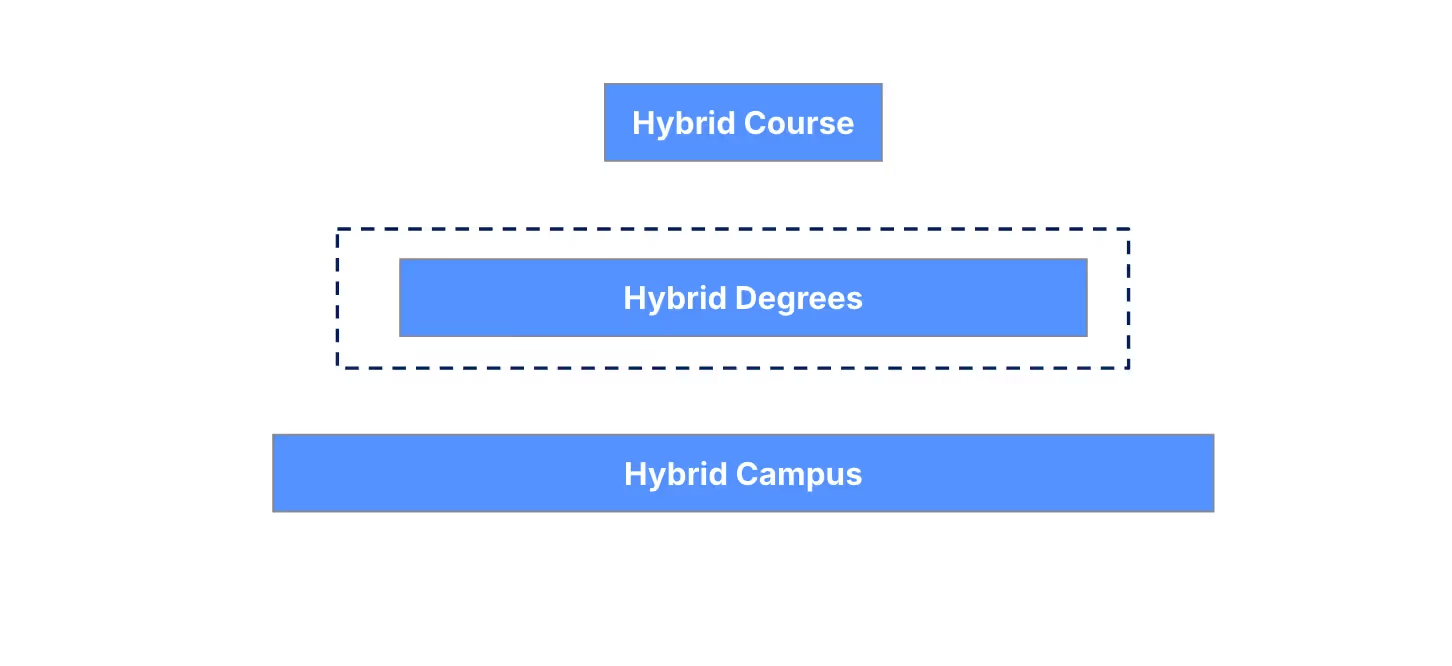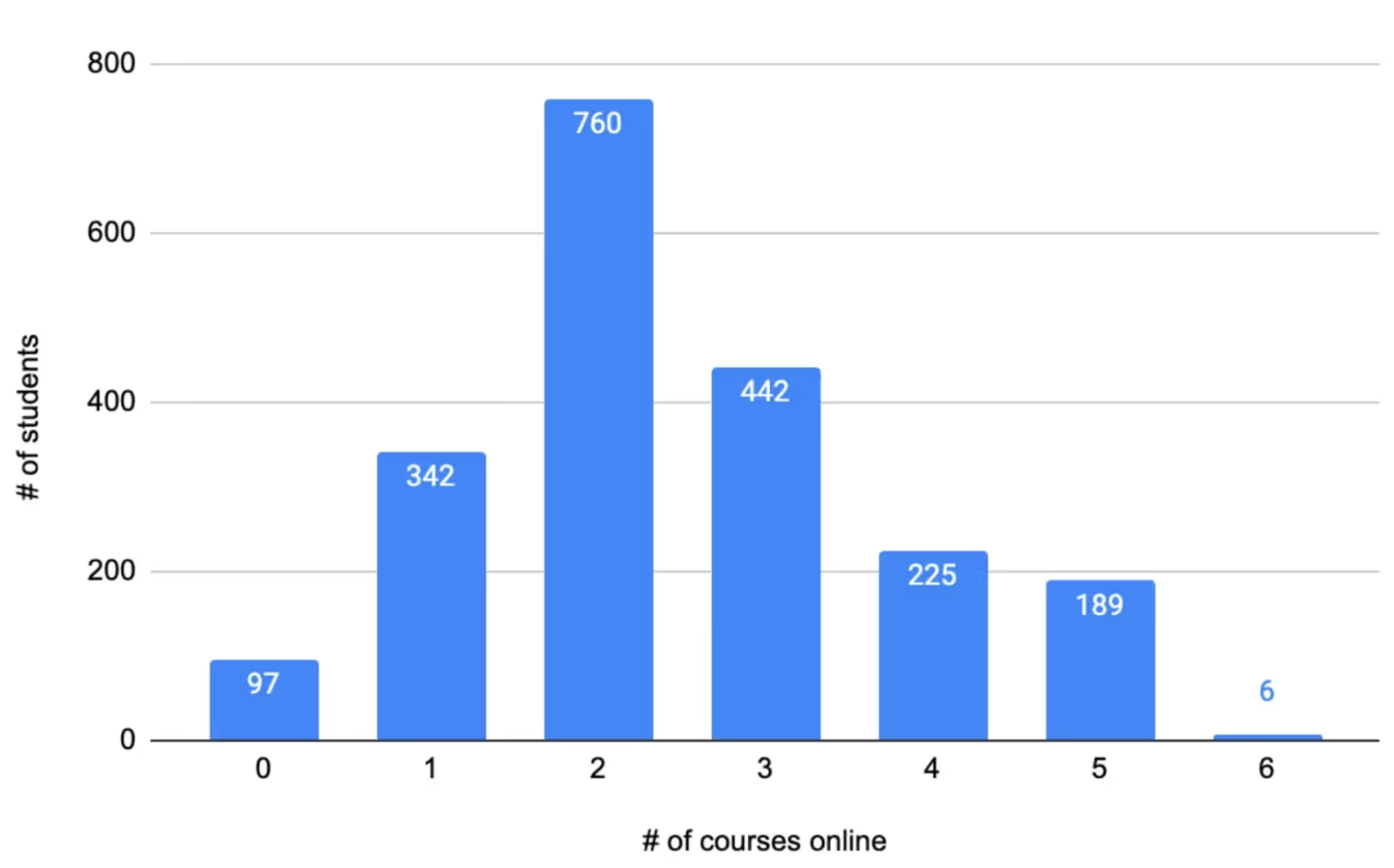Why The College of the Future is Hybrid
Discover the future of higher education with the hybrid campus model, blending online & in-person experiences for a dynamic learning environment.

This week, we hosted a webinar in partnership with The Chronicle of Higher Education titled "Benefits of the Hybrid Campus." The hybrid campus model is gaining traction at institutions across the country and there's growing interest in learning how to leverage it — in fact, nearly 700 higher education professionals registered for the event to learn more.
So, what's all of the hype for? Who wants hybrid learning? What types of institutions can benefit from it? And what even is a hybrid campus?
We were joined by experts in the hybrid model to answer precisely those questions. Over the course of an hour, Senior Online Learning Analyst Chris Gardiner from Eduventures, Provost Graciela Caneiro-Livingston from Nebraska Wesleyan University, and Retention and Enrollment Services Dean Jake Docking from Adrian College explored various definitions of hybrid campuses, hybrid learning trends, and how institutions can reimagine residential education in a tech-enabled world by blending online and in-person experiences.
You can watch the recording here or keep reading for a synopsis of the key takeaways.
Defining the Hybrid Campus
One of the best introductory reports of a hybrid campus stems from a 2020 article from Deloitte and Strada, "The hybrid campus: Three major shifts for the post-COVID university." Within it, the report contains the following definition of a hybrid campus:
"The hybrid campus reimagines residential education in a tech-enabled world….This is not only hybrid instruction, but rather a blended, immersive, and digital residential experience that fuses the online and physical worlds across campus."
The hybrid campus goes beyond just offering hybrid instruction. It represents a fusion of online and physical worlds across the entire campus experience. This model aims to preserve the magic of a college campus while leveraging online capabilities to reduce costs and create greater academic opportunities for students. Importantly, it focuses on reimagining residential education rather than building a separate online arm.
It's important to note that hybrid can exist at multiple levels within the academic enterprise. Our webinar focus was on hybrid degrees, or degrees that incorporate fully in person and fully online courses.

At Rize, our high-quality online courses are taught through a consortium of accredited teaching institutions and pair with our partners' existing in person courses to create hybrid degrees.
At the undergraduate level, students take their institution’s liberal arts core classes in person alongside an average of 6 courses online across their entire degree program. Similarly, our MBA specializations leverage the MBA courses you already have and layer in 3-4 industry-specific courses to create in-demand areas of concentration
Research on Hybrid Learning Trends
Senior Analyst of Online & Adult Learning at Eduventures, Chris Gardiner, joined the conversation to present research showing significant growth in hybrid demand (and enrollment), especially among traditional-aged students. Key findings include:
- Overall bachelor’s enrollment declined while online/hybrid enrollment has grown post-pandemic.
- Hybrid enrollment has grown more than fully online enrollment since the pandemic.
- One in four high school prospects expect some form of hybrid learning in college.
However, Chris emphasized that challenges to enable hybrid learning on college campuses remain, as only about half of faculty have experience teaching fully online courses. Even fewer faculty (part-time 33%; full-time 42%) have designed fully online courses. That's where program sharing can help.
Additionally, we presented research on student demand for online learning from a survey of over 2,000 students in Rize courses. We asked students, 'How many online courses would you ideally take in a semester?' Surprisingly (even to us), 86% of the residential undergraduate students surveyed prefer a hybrid learning approach, falling between 1 to 4 online courses per semester ideally. The chart below shows the results indicating 67% of students wanted at least 2 courses online each semester and 95% wanted at least 1 course online. Only 5% prefer entirely on-campus classes, while 9% prefer to have all of their courses online.

Hybrid Campus Case Study: Nebraska Wesleyan University
Founded in 1887, Nebraska Wesleyan University is located on 50 acres in Lincoln, Nebraska and is known for having a tight knit, supportive campus with a nationally recognized liberal arts curriculum. NWU is ranked the #1 independent regional university in Nebraska by U.S. News & World Report. Graciela Caneiro-Livingston, Provost of NWU, shared her experience implementing hybrid majors:
- Launched 5 hybrid majors in Digital Marketing, Financial Planning, Project Management, Esports & Gaming Administration, and Public Health since Fall 2022, now with 56 students majoring and 28 minoring in those programs
- Students typically take 1-2 online courses per semester, allowing NWU to preserve the residential college campus experience while increasing academic opportunity for their students
- Their online courses maintain small class sizes (max 24 students) to preserve faculty-student interactions
- The hybrid approach has allowed for greater flexibility, especially for student-athletes and those pursuing study abroad
Nebraska Wesleyan University has leveraged online courses to expand interdisciplinary offerings while building on existing strengths in multidisciplinary education. Read our Nebraska Wesleyan partner spotlight for more on their hybrid campus case study.
Hybrid Campus Case Study: Adrian College
Founded in 1859, Adrian College is located on 132 acres with 78 facilities just over an hour outside of Detroit in beautiful Adrian, Michigan. Adrian has been ranked as one of the 'Most Innovative Schools' by U.S. News & World Report since 2022. Jake Docking, Dean of Retention and Enrollment Services at Adrian, highlighted their success with hybrid learning:
- Adrian College has successfully launched 27 new hybrid majors in business, technology, engineering, and healthcare over 5 years
- Nearly 50% of their students participate in hybrid learning
- Adrian has recruited 280 new students through these hybrid majors over the last three years
- With the help of hybrid learning, they've outperformed $6 million in preserved revenue compared to peer institutions since 2018
Adrian College maintains a four-year residency requirement, demonstrating that hybrid learning can complement rather than replace the on-campus experience. Read our partner spotlight with Adrian College for more on their innovative strides towards a hybrid campus.
The Hybrid Campus of the Future
Emphasized in the Deloitte + Strada report, one of the reasons hybrid is so transformative is what it means for collaboration.
“Campuses need to recognize that potential solutions go beyond the boundaries of their own institutions and thus turn to a deeper level of collaboration than ever before.”
Institutions, specifically small colleges with limited resources, that collaborate to enable a hybrid campus can successfully accomplish three key objectives:
- Substantially lower costs (and tuition)
- Improved and expanded career paths
- Maintenance of the 4-year experience and credential
Conclusion
The hybrid campus represents an evolving model that allows institutions to preserve their unique identity while expanding opportunities through online learning. As the higher education landscape continues to change, colleges and universities must explore how hybrid approaches can best serve their students and institutional missions.
If there's one thing to take away from our webinar, it's that the need to continue learning about and experimenting with hybrid models to create an ongoing conversation in which all can participate and contribute.
If you’re interested in accelerating your institution’s speed-to-market with hybrid learning, request a call and a member of the Rize team will be in touch shortly.

Why The College of the Future is Hybrid
Discover the future of higher education with the hybrid campus model, blending online & in-person experiences for a dynamic learning environment.
This week, we hosted a webinar in partnership with The Chronicle of Higher Education titled "Benefits of the Hybrid Campus." The hybrid campus model is gaining traction at institutions across the country and there's growing interest in learning how to leverage it — in fact, nearly 700 higher education professionals registered for the event to learn more.
So, what's all of the hype for? Who wants hybrid learning? What types of institutions can benefit from it? And what even is a hybrid campus?
We were joined by experts in the hybrid model to answer precisely those questions. Over the course of an hour, Senior Online Learning Analyst Chris Gardiner from Eduventures, Provost Graciela Caneiro-Livingston from Nebraska Wesleyan University, and Retention and Enrollment Services Dean Jake Docking from Adrian College explored various definitions of hybrid campuses, hybrid learning trends, and how institutions can reimagine residential education in a tech-enabled world by blending online and in-person experiences.
You can watch the recording here or keep reading for a synopsis of the key takeaways.
Defining the Hybrid Campus
One of the best introductory reports of a hybrid campus stems from a 2020 article from Deloitte and Strada, "The hybrid campus: Three major shifts for the post-COVID university." Within it, the report contains the following definition of a hybrid campus:
"The hybrid campus reimagines residential education in a tech-enabled world….This is not only hybrid instruction, but rather a blended, immersive, and digital residential experience that fuses the online and physical worlds across campus."
The hybrid campus goes beyond just offering hybrid instruction. It represents a fusion of online and physical worlds across the entire campus experience. This model aims to preserve the magic of a college campus while leveraging online capabilities to reduce costs and create greater academic opportunities for students. Importantly, it focuses on reimagining residential education rather than building a separate online arm.
It's important to note that hybrid can exist at multiple levels within the academic enterprise. Our webinar focus was on hybrid degrees, or degrees that incorporate fully in person and fully online courses.

At Rize, our high-quality online courses are taught through a consortium of accredited teaching institutions and pair with our partners' existing in person courses to create hybrid degrees.
At the undergraduate level, students take their institution’s liberal arts core classes in person alongside an average of 6 courses online across their entire degree program. Similarly, our MBA specializations leverage the MBA courses you already have and layer in 3-4 industry-specific courses to create in-demand areas of concentration
Research on Hybrid Learning Trends
Senior Analyst of Online & Adult Learning at Eduventures, Chris Gardiner, joined the conversation to present research showing significant growth in hybrid demand (and enrollment), especially among traditional-aged students. Key findings include:
- Overall bachelor’s enrollment declined while online/hybrid enrollment has grown post-pandemic.
- Hybrid enrollment has grown more than fully online enrollment since the pandemic.
- One in four high school prospects expect some form of hybrid learning in college.
However, Chris emphasized that challenges to enable hybrid learning on college campuses remain, as only about half of faculty have experience teaching fully online courses. Even fewer faculty (part-time 33%; full-time 42%) have designed fully online courses. That's where program sharing can help.
Additionally, we presented research on student demand for online learning from a survey of over 2,000 students in Rize courses. We asked students, 'How many online courses would you ideally take in a semester?' Surprisingly (even to us), 86% of the residential undergraduate students surveyed prefer a hybrid learning approach, falling between 1 to 4 online courses per semester ideally. The chart below shows the results indicating 67% of students wanted at least 2 courses online each semester and 95% wanted at least 1 course online. Only 5% prefer entirely on-campus classes, while 9% prefer to have all of their courses online.

Hybrid Campus Case Study: Nebraska Wesleyan University
Founded in 1887, Nebraska Wesleyan University is located on 50 acres in Lincoln, Nebraska and is known for having a tight knit, supportive campus with a nationally recognized liberal arts curriculum. NWU is ranked the #1 independent regional university in Nebraska by U.S. News & World Report. Graciela Caneiro-Livingston, Provost of NWU, shared her experience implementing hybrid majors:
- Launched 5 hybrid majors in Digital Marketing, Financial Planning, Project Management, Esports & Gaming Administration, and Public Health since Fall 2022, now with 56 students majoring and 28 minoring in those programs
- Students typically take 1-2 online courses per semester, allowing NWU to preserve the residential college campus experience while increasing academic opportunity for their students
- Their online courses maintain small class sizes (max 24 students) to preserve faculty-student interactions
- The hybrid approach has allowed for greater flexibility, especially for student-athletes and those pursuing study abroad
Nebraska Wesleyan University has leveraged online courses to expand interdisciplinary offerings while building on existing strengths in multidisciplinary education. Read our Nebraska Wesleyan partner spotlight for more on their hybrid campus case study.
Hybrid Campus Case Study: Adrian College
Founded in 1859, Adrian College is located on 132 acres with 78 facilities just over an hour outside of Detroit in beautiful Adrian, Michigan. Adrian has been ranked as one of the 'Most Innovative Schools' by U.S. News & World Report since 2022. Jake Docking, Dean of Retention and Enrollment Services at Adrian, highlighted their success with hybrid learning:
- Adrian College has successfully launched 27 new hybrid majors in business, technology, engineering, and healthcare over 5 years
- Nearly 50% of their students participate in hybrid learning
- Adrian has recruited 280 new students through these hybrid majors over the last three years
- With the help of hybrid learning, they've outperformed $6 million in preserved revenue compared to peer institutions since 2018
Adrian College maintains a four-year residency requirement, demonstrating that hybrid learning can complement rather than replace the on-campus experience. Read our partner spotlight with Adrian College for more on their innovative strides towards a hybrid campus.
The Hybrid Campus of the Future
Emphasized in the Deloitte + Strada report, one of the reasons hybrid is so transformative is what it means for collaboration.
“Campuses need to recognize that potential solutions go beyond the boundaries of their own institutions and thus turn to a deeper level of collaboration than ever before.”
Institutions, specifically small colleges with limited resources, that collaborate to enable a hybrid campus can successfully accomplish three key objectives:
- Substantially lower costs (and tuition)
- Improved and expanded career paths
- Maintenance of the 4-year experience and credential
Conclusion
The hybrid campus represents an evolving model that allows institutions to preserve their unique identity while expanding opportunities through online learning. As the higher education landscape continues to change, colleges and universities must explore how hybrid approaches can best serve their students and institutional missions.
If there's one thing to take away from our webinar, it's that the need to continue learning about and experimenting with hybrid models to create an ongoing conversation in which all can participate and contribute.
If you’re interested in accelerating your institution’s speed-to-market with hybrid learning, request a call and a member of the Rize team will be in touch shortly.

